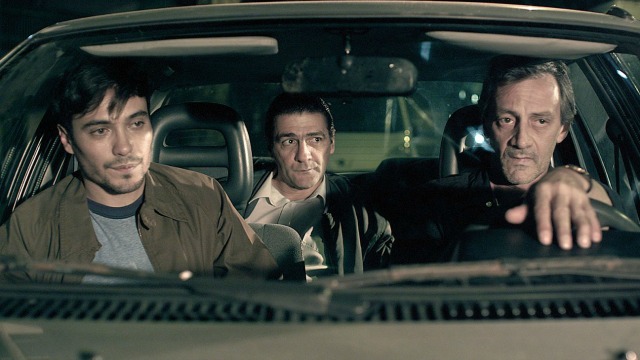Chicago Latino Film Festival Sampler: A Must-See, A Must-Skip And A Definite Maybe
By Joel Wicklund in Arts & Entertainment on Apr 14, 2015 6:00PM

"Operation Zanahoria" (Photo: © Lavoragine Films)
This year's Chicago Latino Film Festival is now in full swing, with dozens of movies from Spanish-speaking nations across the globe (as well as many made here in the U.S) playing to eager audiences at AMC's River East 21 through April 23. As our festival preview noted, there are sure to be some welcome discoveries, and we have one that especially demands attention in the three reviews that follow.
Operation Zanahoria
(Saturday, April 18, 7:30 p.m. & Sunday, April 19, 4 p.m.)
This drama from Uruguay is simply one of the sharpest films I've seen about the perils of investigative journalism. Based on a true story, it follows two writers for a small, weekly publication in 2004 who are contacted by a mysterious source who promises explosive evidence about powerful men responsible for the fate of hundreds of citizens imprisoned and then "disappeared" (presumed murdered but never found) during the military dictatorship that ruled the country from 1973 to 1984. The secretive source claims he was part of military intelligence and suggests his evidence even plays into the upcoming presidential election.
Operation Zanahoria (which translates to a far less exotic "Operation Carrot") owes a lot to All the President's Men. Like that 1976 classic about the Watergate investigation, this is a procedural film that focuses on the details of reporting, while still generating simmering suspense as the truth gets closer to being revealed. Writer-director Enrique Buchichio uses superb widescreen composition and a little bit of film noir style to build a quietly threatening atmosphere in each meeting between the reporters and their source. The editing is also potent, especially in a montage of anxiously awaited calls, where a cell phone's chirp raises the reporters' anxiety, along with that of the viewer. The entire cast delivers fine, understated performances, particularly Abel Tripaldi as the veteran reporter and Martin Rodriguez as an inexperienced culture writer pulled into the "hard news" world.
With meetings on dimly lit back roads, menacingly isolated garages, realistic newsroom dynamics, and even its own "Deep Throat," at first it seems like Operation Zanahoria is too much in the shadow of All the President's Men. But that similarity, and the expectations of those who have seen the earlier movie, ends up working for the film in an unexpected way—at least for those unfamiliar with how the events played out in real life. The movie reveals itself as an insightful, cautionary tale of the murky waters reporters wade into when a big story seems to land in their laps.
Guard Dog
(Thursday, April 16, 8:45 p.m. & Saturday, April 18, 10 p.m.)
Latin American military crimes also play a part in this brooding Peruvian film, which borders on the masterful early in its running, but ultimately slips downward into a tonally confused state. Still, there are scenes to admire in this grim drama that has some kinship to Scorsese's Taxi Driver (1976) and Jean-Pierre Melville's Le Samourai (1967).
The hitman simply called "Dog" (an intimidating Carlos Alcantara) has some of the detached coolness of Alain Delon's gun-for-hire in Le Samourai and some of the isolated, sociopathic tendencies of De Niro's Travis Bickle in Taxi Driver. Like Bickle, he's a former military man too. But Dog is still entrenched in that world, taking out those who might reveal too much as Peru's amnesty law for those who committed atrocities under military orders is about to expire.
Guard Dog is at its best when Dog seems almost unknowable—a mechanism more than a man. As his past sins come to the forefront, however, the film can't really reconcile its portrait of the psychological impact of committing war crimes with its earlier "movie cool" moments. Still, co-directors Bacha Caravedo and Chinón Higashionna show enough promise in their first feature to make one curious where their careers will go next.
The House at the End of Time
(Tuesday, April 21, 9 p.m. & Wednesday, April 22, 6:30 p.m.)
Already out on DVD in this country since last fall, this 2013 Venezuelan horror film is not only a little late for a festival showcase, but not really worthy of it. The filmmakers obviously were aiming for a classical, gothic style that Hispanic directors have often favored—Guillermo del Toro's The Devil's Backbone (2001), Alejandro Amenebar's The Others (2001) and J.A. Bayona's The Orphanage (2007) are three excellent contemporary examples. But despite some narrative ambition and handsome production values, the movie falls well short of its influences.
The story concerns a woman convicted of murdering her husband and child. Thirty years later, she is permitted a guarded house arrest at the same home where the bloodshed occurred, which is either very lazy screenwriting or a case of Venezuelan law being absolutely bonkers.
Of course, as the title suggests, the home itself and its lethal history is behind everything. The tale is spun well enough early on to keep you watching in spite of an overkill of cheap jump scares and soundtrack stings. But then flashbacks to the youthful antics of her children and subsequent traumas move the film to more maudlin territory. Things take an irreversible turn toward the daffy in climactic moments that oddly mirror the goofy, time-tripping revelations at the end of Christopher Nolan's Interstellar. If all the generational jumping makes any sense at all, the story does a poor job of successfully connecting the dots.
Click here for the complete Chicago Latino Film Festival schedule.